| THE SONG OF MOSES
AND THE LAMB
TABLE OF CONTENTS |
Part
I
Knowledge Not Automatic
Commandment Not Too Hard
|
Part
III
God Punishes His People
Why Doesn't God Cast Them Away?
"Sealed Up Treasures"
God's Declaration
|
Part
II
The Song of Moses
The Rock
Jacob His Heritage
A Desert Land
An Eagle Stirreth Up Her Nest
Jeshurun Waxed Fat
Moved Me to Jealousy
|
Part
IV
Ezekiel 38:18-23
The Song of the Lamb
Overcoming the Beast and Image
"It Is Your Life" |

Part I
Song of Moses:
|
"Because I will
publish the name of the Lord: ascribe ye greatness unto our God. He is the Rock, his work
is perfect: for all his ways are judgment: a God of truth and without iniquity, just
and right is he." Deuteronomy 32: 3, 4
|
Song of Moses and the Lamb:
|
"And they sing
the song of Moses the servant of God, and the song of the Lamb, saying, Great and
marvelous are thy works, Lord God Almighty; just and true are thy ways,
thou King of saints. Who shall not fear thee, O Lord, and glorify thy name? for thy judgments
are made manifest." Revelation 15:3, 4
|
Moses said: "Just
and right" are God’s "judgments."
Deuteronomy 32
The Lamb says: "Just and true" are "thy judgments."
Revelation 15.
The Song of Moses is the one given by Moses to Israel the day that
he died. It is called the Song of Moses and also the Song of the Lamb, because the Lamb
later confirms that same Song to us. That brings certain majesty to it.
Moses may very well have been one of the greatest men of God that ever
lived. When we combine his Song with the Song of the Lamb, the Son of God, that is a duet
that will long live in our hearts and memories. There is an unforgettable beauty and
melody that lingers to all who hear it.
There were two songs given by Moses, forty years apart, one at the
crossing of the Red Sea and the other was the song Moses sang the day that he died.
Moses' Song
at the Crossing of the Red Sea |
Moses' Song
at his Death |
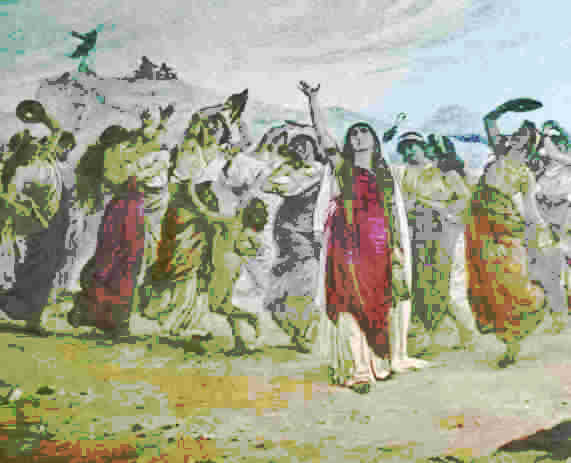
Song of Moses after Red Sea |
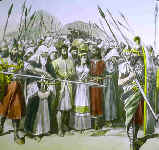
Israel Taken into Captivity |
|
The first song of Moses was a song of triumph and of God’s judgment on His enemies.
This song will be sung at the end of the Millennium, after all the
people of God have passed the Second Death.
It is a song of deliverance for God’s people and judgment
against their enemies.
|
Whereas the Song of Moses and the Lamb proclaims God’s judgments and punishments
against His own people.
When that work is done, He receives His chastened people and then
punishes the enemies of His people.
|
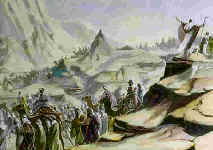
Crossing the Red Sea |
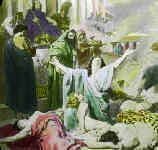
Israel Persecuted |
|
The song sung after the crossing of the Red Sea is recorded in Exodus 15:1-19.
Both Moses and the children of Israel sang this together.
|
The Song of Moses and the Lamb is a two-fold punishment. This, therefore, pertains to both
the Jewish and Gospel Ages.
It is similar to the Major Prophets such as Isaiah, Jeremiah and
Ezekiel who pronounced judgments against Israel but also against their enemies. Because it
covers two ages it became the Song of Moses and the Lamb.
|
The real
Song of Moses is the one that he sang the day that he died.
The Lord then took him, putting him to sleep by the word or mouth (I like to think of it as
a kiss) of the Lord. This song contains the parting message of one of the greatest
servants of God that ever lived, our Lord Jesus being excepted. It is this song that
the Lamb also sings.
Moses visited each of the tribes before he offered this song. No
doubt he had many wonderful things to tell each tribe. There were personal ties and warm
friendship involved in this last exchange as well as very serious exhortations. They knew
he was to leave them. There was a serenity and sense of awe and wonderment that gripped
the people still living there on the other side of the Jordan waiting to enter the
Promised Land.
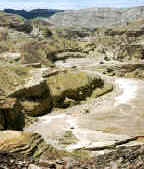
Wilderness Wanderings |
The realization that he had led them these forty years, and now at the critical moment
when they were to enter the Promised Land, they realized they must do so without that
great servant of God to lead them.
Whatever their sins, whatever their murmurs of the past that had been
against Moses, that was all gone.
|
They could not, at this point in time, hide
their great love and affection for Moses. They truly loved him.
Love has a way of winning out at the end. If you can’t win people
with love you can’t win them any better way. Moses’ love for his people had
finally won, and they truly loved him.
Unquestionably, he had been their meeting place with God. They all
knew this. Now that the nation had finally come to appreciate him for the legend that he
was among them, he was to leave them. No longer would they have his awe-inspiring presence
and his great leadership.
Great moments such as this have not often come. When they do, few
are aware of the great drama occurring. But here, the whole nation was awake. They were at
full attention. They were listening to Moses, the servant of God, even while tears of
sorrow filled their eyes.
How could they hold back their sorrow and tears knowing this was the
last time their beloved leader would speak to them—that
would last forever in their hearts and minds.
This song was no ordinary song. This song was never to be forgotten
and to make certain of this the Lamb of God picked it up and taught it to the saints.
We must never forget it either. Once having heard it, we also must learn it and
sing it with him. We will refer to Revelation 15 later.
Do not think that Moses’ last words were full of sweetness and
tender reflections on the journey that they had shared in the wilderness. This refrain of
the Lamb is heard in Revelation l5 and constitutes the chorus to the Song of Moses.
Considering Moses’ last words, we learn there was no need for
Moses to build monuments with words touching those great things that had happened in their
singular relationship with God. Moses needed to spend no time generating warmth and
affection. It was there already.
You see, Moses was a Prophet, and as a
Prophet sometimes there is
unhappiness about knowing things which will come to pass. It had been revealed to Moses
what would happen at his passing. He knew things that were heavy on his heart.
Let us not underestimate the value of prophecy. How often we do. We are
not encouraged to do so by any scripture. In Hosea 12:13 we read:
"And by a prophet the Lord brought Israel out of Egypt, and by a prophet
was he preserved."
Prophecy is necessary for both being delivered and preserved. The
Song of Moses was written down as a part of the Book of the Law. It was taught to the
people and later it was preserved in the Ark of the Covenant. It became a part of Law
together with the two tables of stone. Yes, the Song of Moses was there also. We read this
in Deuteronomy 31:24-26:
|
"And it came to pass,
when Moses had made an end of writing the words of this law in a book, until they were
finished,
"That Moses commanded the
Levites, which bare the ark of the covenant of the Lord, saying,
"Take this book of the law and put it in the side of
the ark of the covenant of the Lord your God, that it may be there for a witness against
thee." |
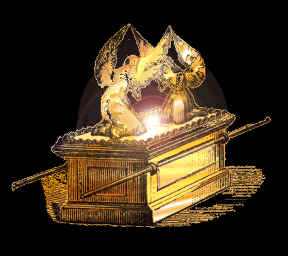
|Ark of the Covenant
|
This showed its eternal qualities and the weight God associated with
these words.
The reason for this song, therefore, was that Moses was a
Prophet,
and God had revealed to him what was going to befall the people of God after they entered
the land of promise. He said to them in
Deuteronomy 31:27-30:
|
"For I know thy
rebellion, and thy stiff neck: behold, while I am yet alive with you this day, ye have
been rebellious against the Lord; and how much more after my death?
"Gather unto me all the elders of your tribes, and your
officers, that I may speak these words in their ears, and call heaven and earth to record
against them.
"For I know that after my death ye will utterly
corrupt yourselves, and turn aside from the way which I have commanded you; and evil will
befall you in the latter days; because ye will do evil in the sight of the Lord, to
provoke him to anger through the work of your hands. "And Moses spake in the ears of all the congregation
of Israel the words of this song, until they were ended."
|
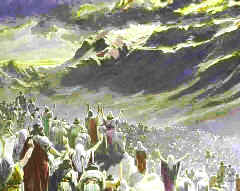
Israel in the wilderness forty years. |
Standing there, the children of Israel, perhaps found it hard to believe their future
conduct would be so perverse.
Here they were, full of love and affection for Moses and really for the
Lord, as they reflected on the long and terrible journey through the wilderness together
these forty years.
|
How could these predictions be true of them and their
children? Surely, they would be better for all the experiences they had shared with Moses.
Perhaps these things would happen way down the road. And to a certain extent that was
true. We read in Joshua 24:31:
"And Israel served the Lord all the days of Joshua, and all the days of
the elders that outlived Joshua, and which had known all the works of the Lord, that he
had done for Israel."
For eighty years after Moses, the children of
Israel at least made some effort in keeping God's law.

Knowledge Does not Automatically
Improve Our Performance
Sometimes, we think, when we have adequate knowledge it
automatically insures protection against taking a wrong course. Knowledge may guide us in
the right way only if acted upon. Moses' words in Deuteronomy
31:19-21:
|
"Now therefore write
ye this song for you, and teach it the children of Israel: put it in their mouths,
that this song may be a witness for me against the children of Israel.
"For when I shall have brought them into the land which I
sware unto their fathers, that floweth with milk and honey; and they shall have eaten and
filled themselves, and waxen fat; then will they turn unto other gods, and serve them, and
provoke me, and break my covenant.
"And it shall come to pass, when many evils and
troubles are befallen them, that this song shall testify against them as a witness; for it
shall not be forgotten out of the mouths of their seed: for I know their imagination which
they go about, even now, before I have brought them into the land which I sware." |
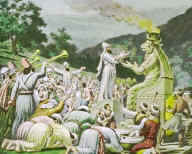
Israel turned to worshipping Moloch |
How true that prophecy was. One of the tragedies of life is in
the fact that one generation cannot give to the next generation their wisdom. How
often parents see their children take a course they know will bring them sorrow and pain,
and yet they are powerless to change matters.
It seems every generation wishes to make mistakes of their own
choosing. How often youth feels strong and impervious to life’s pitfalls, only to be
taken in the snare that countless millions who preceded them had fallen into.
Thank God for the resurrection when all mankind will have a chance to
relive life with personal knowledge of the consequences of sin, when peer pressure will
always be to do the will of God.
By the spirit of prophecy Moses gave the children of Israel an
awesome lesson that was never to be forgotten. The dangers lurked down the road, when they
entered the land and would become comfortable and full. That is when they would relax
their disciplines, and that is when temptations to be like the people round about would
take hold of them.
While these words of Moses served as a witness against them, more
importantly, they would be a consolation to those who took the wrong course in departing
from the Lord. The words of Moses in Deuteronomy 30:1-3 would
also be remembered.
|
"And it shall come to
pass, when all these things are come upon thee, the blessing and the curse, which I have
set before thee, and thou shalt call them to mind among all the nations, whither the Lord
thy God hath driven thee,
"And shalt
return unto the Lord thy God, and shalt obey his voice according to all that I command
thee this day, thou and thy children, with all thine heart, and with all thy soul;
"That then the Lord thy God will turn thy captivity,
and have compassion upon thee, and will return and gather thee from all the nations,
whither the Lord thy God hath scattered thee."
|
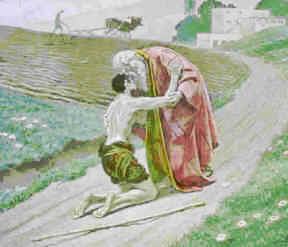
The Prodigal Son |
These words are an indictment against Israel, but also a
consolation. Yes, Israel, like the prodigal son, would in the end find it must return to
the Father’s house, thoroughly humbled, thoroughly chastened, but oh so glad to
return to the house of the Father.
The Lord will have compassion on His people. We read in
Deuteronomy 32:36:
|
"For the Lord will
vindicate his people and have compassion on his servants, when he sees that their power is
gone, and there is none remaining, bond or free."
(ESV)
|
Yes, the Lord will vindicate both His natural people and His
spiritual people.

This Commandment Is Not
Too Hard for You!
Another thing to remember is that the Lord had not given His people
an impossible Law to keep. True, none could keep God’s Law perfectly, but they could
keep its essence while walking humbly before the Lord.
They would be blessed in basket and in store, they would be blessed
when they arose and when they lay down, they would be blest when they went out and when
they came in. They would be blessed and freed from the sicknesses of the surrounding
nations. They would stand before their enemies while their enemies would fall before them.
Sometimes it is easy to conclude that the Law arrangement was an
Albatross hanging around Israel’s neck impeding all of their progress and all of
their hopes. Such is not the case.
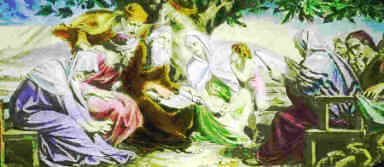
|
|
The Law was
beautiful and worthy of their meditation day and night.
While it could not bring them life in the truest sense, yet it provided
the disciplines necessary for them to walk humbly with their God.
To some, it actually was a schoolmaster to bring them to Christ, while
to others it was a stumbling-stone and a rock of offense.
No the Israelites could not keep the Law to gain everlasting life, but
indeed they could keep it in a way that would bless them richly.
|
We read in
Deuteronomy
30:11-14 (ESV):
|
"For this commandment
that I command you today is not too hard for you, neither is it far off.
"It is not in heaven, that you should say, ‘Who will
ascend to heaven
for us, and bring it to us, that we may hear it and do it?’
"Neither is it beyond the sea, that you should say,
‘Who will go over the sea for us, and bring it to us, that we may hear it and do
it?’
"But the word is very near you; it is in your mouth
and in your heart, so that you can do it."
|
Yes, "You can do it!" That is the message Moses left with
the people, and that is what we must never forget.
Many might be inclined to say, "Why should God and Moses bother
with a people who are going to forget God?" Why not just let them go unhindered in
the evil course they were disposed to take? Why tell them that they would be chastened for
their evil ways and that afterward God would be gracious to them?
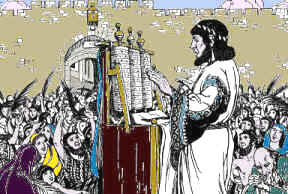
Ezra Reading Law to People |
Because God loved the people and He tried to provide them with the entire moral helps and
strengths He could instill within them.
That even if they wandered from Him they would remember their way back
to God’s fold.
|
God is always merciful and gracious
to receive them, when at last they return with all their heart to Him.
Click to go to the following:
Topical Studies on:
The Song of Moses and the Lamb Part I - Part
II - Part III - Part IV
Topical Studies on:
Dedicating the Temple Part I - Part
II - Part III - Part IV
Chapter/Verse by Verse Study on Revelation 15
Topical Study Home Page - Chapter Study Home Page
- Sinaitic Manuscript - Questions - Glossary.
E-Mail
Day7000@sbcglobal.net with comments.
Copyright 2001 John Class
|